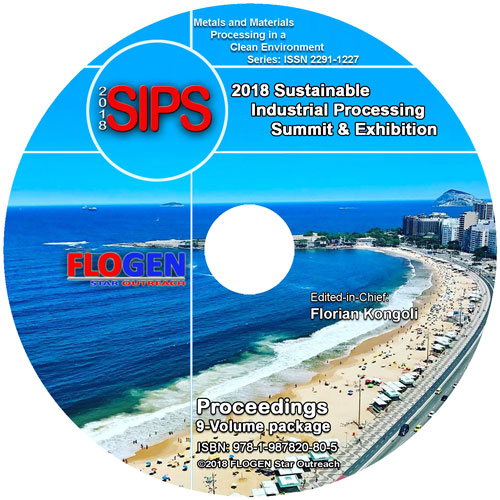2018-Sustainable Industrial Processing Summit
SIPS2018 Volume 5. Zehetbauer Intl. Symp. / SISAM
| Editors: | F. Kongoli, S. Kobe, M. Calin, J.-M. Dubois, T. Turna |
| Publisher: | Flogen Star OUTREACH |
| Publication date: | 23 December 2018 |
| Pages: | 154 pages |
| ISBN: | 978-1-987820-90-4 |
| ISSN: | 2291-1227 (Metals and Materials Processing in a Clean Environment Series) |

CD shopping page
Ultrafine-grained Plates with Enhanced Mechanical Properties, Low Anisotropy and Good Formability
Malgorzata Lewandowska1; Marta Ciemiorek1; Lech Olejnik1; Witold Chrominski1;1WARSAW UNIVERSITY OF TECHNOLOGY, Warsaw, Poland;
Type of Paper: Invited
Id Paper: 239
Topic: 42
Abstract:
Incremental ECAP, unlike conventional ECAP, works in small steps in which deformation and feeding are divided between two different tools acting asynchronously. Incremental processing reduces forces and allows processing in relatively large billets. The major advantage of this technique is that the specimens are in the form of plates with a rectangular shape, which makes them suitable for further processing, e.g. via deep drawing, which may extend the range of potential applications of UFG materials.
Plates of 1xxx and 3xxx series aluminum were processed by Incremental ECAP and evaluated in terms of microstructure, mechanical properties, anisotropy and formability. It was demonstrated that incremental ECAP is one of the most effective severe plastic deformation methods in terms of grain size refinement and high angle grain boundaries formation. Eight passes brings about grain size reduction to below 500 nm and very high fraction of high angle grain boundaries of about 80%. The plates exhibit in planar and through thickness isotropy which manifest by the independence of YS, UTS and R -values on the testing direction and fairly uniform distribution of microhardness across thickness. Such properties were attributed to randomized texture developed during processing and uniform microstructure with ultrafine equiaxed grains in all three plate's planes. The values of the parameters describing ability for deep drawing are very promising, as r values only slightly decrease with I-ECAP passes while they became independent on testing direction. This indicates that although the processed plates are slightly prone to wall thinning (typical for aluminum alloys), they are resistant to earing formation, which is one of the main technological problem in deep drawing. The combination of isotropic parameters, enhanced mechanical strength, and suitable ability to deep drawing may yield attractive products with a considerable potential for further forming.
Keywords:
Advanced materials;References:
[1] W. Chrominski, L. Olejnik, A. Rosochowski, M. Lewandowska, Grain refinement in technically pure aluminium plates using incremental ECAP processing, Mater. Sci Eng. A636 (2015) 172-180[2] M. Ciemiorek, W. Chromiński, L. Olejnik, M. Lewandowska, Evaluation of mechanical properties and anisotropy of ultra-fine grained 1050 aluminum sheets produced by incremental ECAP, Mater. Des. 130 (2017) 392-402